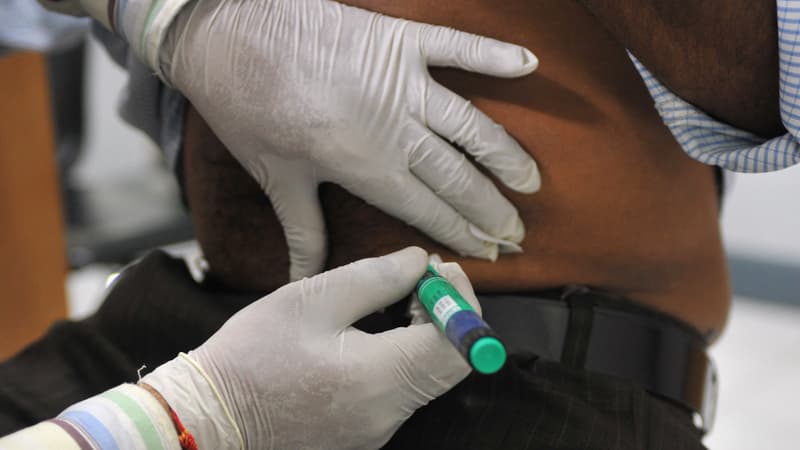Inject diabetes drugs to lose weight? For several months, on TikTok in particular, users filmed themselves, week after week, injecting themselves with Ozempic or Trulicity to finally show off pounds on the scale and a slimmer silhouette. Some of the hashtags dedicated to this method thus accumulate close to half a billion views.
Ozempic and Trulicity are originally two injectable antidiabetics involved in glycemic control, prescribed for the treatment of difficult-to-balance type 2 diabetes, often in combination with other drugs. But it is for one of its side effects that they are acclaimed on social networks: weight loss.
However, the National Agency for the Safety of Medicines and Health Products (ANSM) specifies to BFMTV.com that Ozempic “has no indication in obesity or overweight.”
But the phenomenon is such that world demand has skyrocketed, creating supply tensions, especially in the United States. Worse: In Australia, the product won’t be available until April 2023.
“Some pharmacies are experiencing difficulties”
Could France experience such situations? Although the country has 3.5 million people treated with diabetes medication, according to Public Health France, are these patients at risk of being deprived of their treatment? This is the concern of Jean-François Thébau, vice president of the French Federation of Diabetics. “What will happen to people with diabetes if we run out of stock?” is alarmed by BFMTV.com.
“There are already tensions in the French market,” he explains. “Some pharmacies are having a hard time getting supplies.”
This is confirmed by Pierre-Olivier Variot, president of the Union of community pharmacists. “This is already the case with many drugs,” he observes for BFMTV.com. “A week ago, there were supply problems on the Ozempic. Three weeks earlier, on the Trulicity.”
At the moment, this pharmacist from Plombières-lès-Dijon, in the Côte-d’Or, has not yet run out of stock. But his reserves are limited. “I have two weeks left”, specifies Pierre-Olivier Variot. “These are products that can be kept in the fridge. With the risks of disconnection of the electrical charge, I cannot keep any more.”
When it comes to prioritizing certain clients, you find it impossible to differentiate between truly diabetic patients and non-diabetic patients. “When a person comes with a prescription, the medication is not necessarily combined with something else that can confirm diabetes. Sometimes there are individual prescriptions.”
After referring in September to “strong tensions in the supply” of Ozempic and Trulicity “due to a significant increase in global demand”, the ANSM reminded doctors “to prescribe these medicines only to patients with type 2 diabetes”. But questioned by BFMTV.com, she wants to be reassuring.
“At this stage (…), the sales of Ozempic have been increasing gradually since its commercialization (mid-2019), the curves are consistent with the commercialization of a new drug,” indicates the National Agency for Medicines Safety, which add :
“There is no particular spike or surge in recent months in consumption in France (…) that could suggest a use (…) for weight loss.”
However, a reinforced follow-up has been put in place. In the first quarter of 2023, a first report should be published that collects data on sales, social network monitoring and cases of misuse with or without adverse effects. Because that’s the problem.
The adverse effects, these two drugs accumulate, in addition to weight loss. Nausea, vomiting and diarrhea from Trulicity, which affects more than 1 in 10 patients, specifies the Vidal medical dictionary. As for Ozempic, in addition to the intestinal disorders mentioned above, it also treats dizziness, increased heart rate and damage to the pancreas, still indicates Vidal’s site.
“Weight loss is a classic effect of these molecules,” explains Cédric Moro, research director of Inserm at the Institute of Metabolic and Cardiovascular Diseases, to BFMTV.com. From the order of 4 to 6 kilos in a year at the doses provided for people with diabetes, according to him. “But in the deviations that we’re seeing, the doses are three to four times higher.”
“The problem is that when you increase the doses, the side effects also increase, which are then much more serious than nausea or diarrhea,” he warns.
Among these, Cédric Moro evokes thyroid problems, gallstones, acute pancreatitis or even serious kidney damage. “It can be a life-threatening emergency,” he further warns. “The health risks are great.”
“The risks are great”
This specialist in metabolic diseases reminds us that a drug should never be used off-label or its dosage should be changed on one’s own initiative. A warning also formulated by Bruno Maleine, president of section A of the National Order of Pharmacists, representing the pharmacists who own pharmacies.
“They are prescription drugs that require medical supervision, including blood tests,” he reminds BFMTV.com. “These are not trivial drugs.”
The truth is that these two anti-diabetics continue to give people something to talk about on social networks. Elon Musk, the controversial head of Twitter and Tesla, even promoted a similar product, Wegovy, made by the same laboratory as Ozempic, and containing the same active ingredient (semaglutide).
But in France, if this new product has received a marketing authorization, it is not yet on the market and remains reserved, in a hospital setting, for people suffering from obesity with comorbidity.
Source: BFM TV


